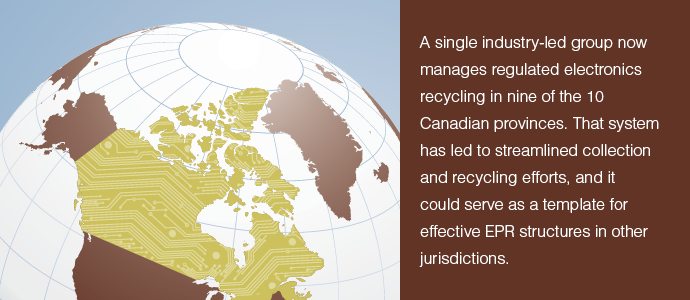 The Indian government has released rules intended to bolster an organized system of e-scrap processing by gradually increasing collection requirements for manufacturers.
The Indian government has released rules intended to bolster an organized system of e-scrap processing by gradually increasing collection requirements for manufacturers.

 The Indian government has released rules intended to bolster an organized system of e-scrap processing by gradually increasing collection requirements for manufacturers.
The Indian government has released rules intended to bolster an organized system of e-scrap processing by gradually increasing collection requirements for manufacturers.
 Processors in California will soon receive reimbursement rates that vary based on the type of device recycled. Regulators this week approved a variable payment rate system in response to the changing end-of-life electronics stream.
Processors in California will soon receive reimbursement rates that vary based on the type of device recycled. Regulators this week approved a variable payment rate system in response to the changing end-of-life electronics stream.
Continue Reading
March 2018 marks the one-year anniversary of the electronics recycling program launching in New Brunswick, the ninth province to leverage the electronics recycling program administered by the Electronics Product Recycling Association (EPRA). Continue Reading
 European coalitions representing electronics manufacturers have launched an internet-based information service designed to help processors better recycle devices.
European coalitions representing electronics manufacturers have launched an internet-based information service designed to help processors better recycle devices.
 A Singapore leader says the small Southeast Asian country will implement extended producer responsibility for electronics by 2021.
A Singapore leader says the small Southeast Asian country will implement extended producer responsibility for electronics by 2021.

Total Reclaim was fined by state regulators for storing flat-panel display devices in trailers on Seattle’s Harbor Island.
No longer receiving material from state electronics recycling programs in Washington and Oregon, processor Total Reclaim is attempting to weather recent regulatory hurdles and set its sights on future growth.
This story originally appeared in the June 2016 issue of E-Scrap News.
Subscribe today for access to all print content.


This article originally appeared in the September 2017 issue of E-Scrap News. Subscribe today for access to all print content. Continue Reading
 State lawmakers are considering a number of bills related to state electronics recycling programs this year, including two that create new extended producer responsibility laws.
State lawmakers are considering a number of bills related to state electronics recycling programs this year, including two that create new extended producer responsibility laws.
 A TV collection debacle in one Pennsylvania township illustrates the problems the state electronics recycling program continues to face.
A TV collection debacle in one Pennsylvania township illustrates the problems the state electronics recycling program continues to face.
